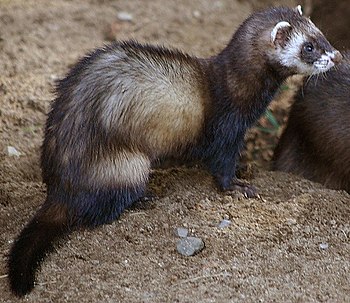Both the ferret and the polecat belong to the weasel family and look very similar but there are a number of differences that set them apart. Often known as the domesticated polecat, ferret pets are gregarious while polecats prefer to stay alone. Ferrets can be differentiated on the basis of a number of features especially smell. Polecats are known to emanate a distinctive smell that can be attributed to their secretion.
 |
| Polecat (Mustela putorius) (Photo credit: Wikipedia) |
Another distinguishing factor between the polecat and the ferret is that the polecat can choose when it wants to get pregnant. The implantation time can be decided by the polecat. Therefore the polecat can decide when the right time is to breed. However the ferret cannot choose to control implantation.
Ferrets have small ears, a sensitive nose, sharp teeth and a long, sinuous body. On the other hand polecats have long and lean bodies with sensitive whiskers, short muzzles and rounded ears. Polecats are not known for their eyesight unlike the ferret, they make their way around with the help of their nose.
Polecats are purely carnivorous and survive on fish, fish eggs, small birds and reptiles. While ferrets are also known to be carnivorous they enjoy eating sweets like raisins, bananas, and peanut butter.
A Polecat, ferret and cat although are similar in many aspects, differ a lot in terms of temperament, dietary habits and mating patterns etc. All of them belong to the same family but basic behavioural patterns like curiosity, tenacity and gregariousness make them completely different from each other.
Ferrets make great pets and if trained properly they can shower you with all the love and companionship you need. They love sharing their space and do no get territorial. Polecats cannot be domesticated and will not make good pets because they are too solitary and hate sharing their space with other polecats even.
Since they look so similar and have so many similarities it is essential for one to know the common differences between a polecat, ferret and cat if you wish to bring one home. A ferret is indeed a great choice for a pet as they are tiny, playful and extremely lovable.
Clint is a ferret enthusiast who enjoys giving information about Polecat, Ferret. You can learn more about taking care of ferrets the correct way at FerretCareHelp.com [ Article Source: EzineArticles |

